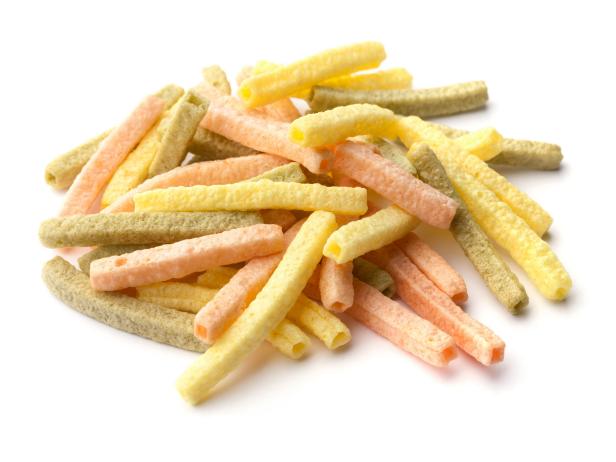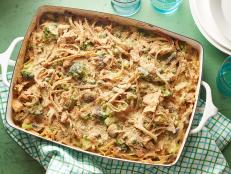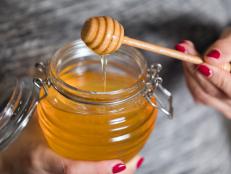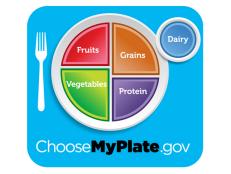Are Veggie Straws Healthy?
Some say this popular snack food counts toward your daily recommended vegetables. Here's what a dietitian has to say.

duckycards/Getty Images
Colorful veggie straws have been flying off shelves thought to be a healthier alternative to fried potato chips. There’s even buzz that these crunchy sticks count towards your daily recommended vegetables. Find out if veggie straws are really that healthy.
What are Veggie Straws?
According to a popular veggie straw brand's website, their straws combine “garden-grown potatoes and ripe vegetables to form a better-for-you snack.” Per 1 oz portion (or 38 straws) it provides 130 calories, 7g total fat, 1g saturated fat, 220mg sodium, 17g total carbs, 0g fiber, less than 1g protein, and 6% of the daily value of calcium, and 4% the daily value of each iron and potassium. They claim that their 38 straw serving contains 30% less fat than the leading potato chip, which equates to 7g fat in the veggie straws compared to 10g fat in the leading potato chip per 28g serving. The veggie straws are also non-GMO, certified gluten-free, certified kosher, cholesterol free and have no artificial flavors or preservatives. The ingredient list for the sea salt flavor is:
POTATO STARCH, POTATO FLOUR, EXPELLER PRESSED CANOLA OIL AND/OR SAFFLOWER OIL AND/OR SUNFLOWER OIL, SPINACH POWDER, TOMATO PASTE, SALT, CANE SUGAR, CORN STARCH, POTASSIUM CHLORIDE, TURMERIC (COLOR), BEETROOT POWDER (COLOR), SEA SALT.
Are Veggie Straws Healthy?
The calories per ounce of veggie straws are slightly lower than for the average potato chip which runs at about 150 calories. The crunchy mouthfeel and various shapes available (straws or chips) may make it a satisfying snack.
But don’t be duped by the word “veggie” in their title. These veggie straws are made from processed parts of potatoes (potato starch and potato flour), spinach (powder), and tomato (paste), which aren’t exactly the same as eating whole veggies. Once the veggies are dried or ground into flour, powder or paste, they lose many of the vitamins, minerals, and phytochemicals (natural plant compounds that help keep you healthy and fight disease) that are found in fresh, frozen, and even canned veggies. The processing leaves you with a product that has more fat and fewer nutrients than if you chose the wholesome counterpart of veggies. Eating these veggie straws aren’t a substitute for eating fresh, frozen, and canned veggies as a side at dinner or in a salad for lunch.
Although these veggie chips may be slightly lower in calories compared to potato chips, the sodium is higher. One ounce of veggie straws provide 220mg per ounce compared to an average of 180mg per ounce in potato chips.
Bottom Line: Not a vegetable substitute.
Enjoy these veggie straws as a starchy snack, and compliment them with a healthful food like hummus or guac for some healthy fat and many more nutrients. These veggie straws do not count as your recommended amount of veggies. Don’t forget to get your daily recommended amount of veggies which is between 2 to 3 cups per day for women 19 years and older (depending on age) and between 2 1/2 to 4 cups per day for men 19 years and older (depending on age). Fresh, frozen, canned, and even 100% vegetable juice counts towards your daily recommended amounts of veggies.
Toby Amidor, MS, RD, CDN, is a registered dietitian and consultant who specializes in food safety and culinary nutrition. She is the author of The Greek Yogurt Kitchen: More Than 130 Delicious, Healthy Recipes for Every Meal of the Day.
*This article was written and/or reviewed by an independent registered dietitian nutritionist.
Related Links:


































